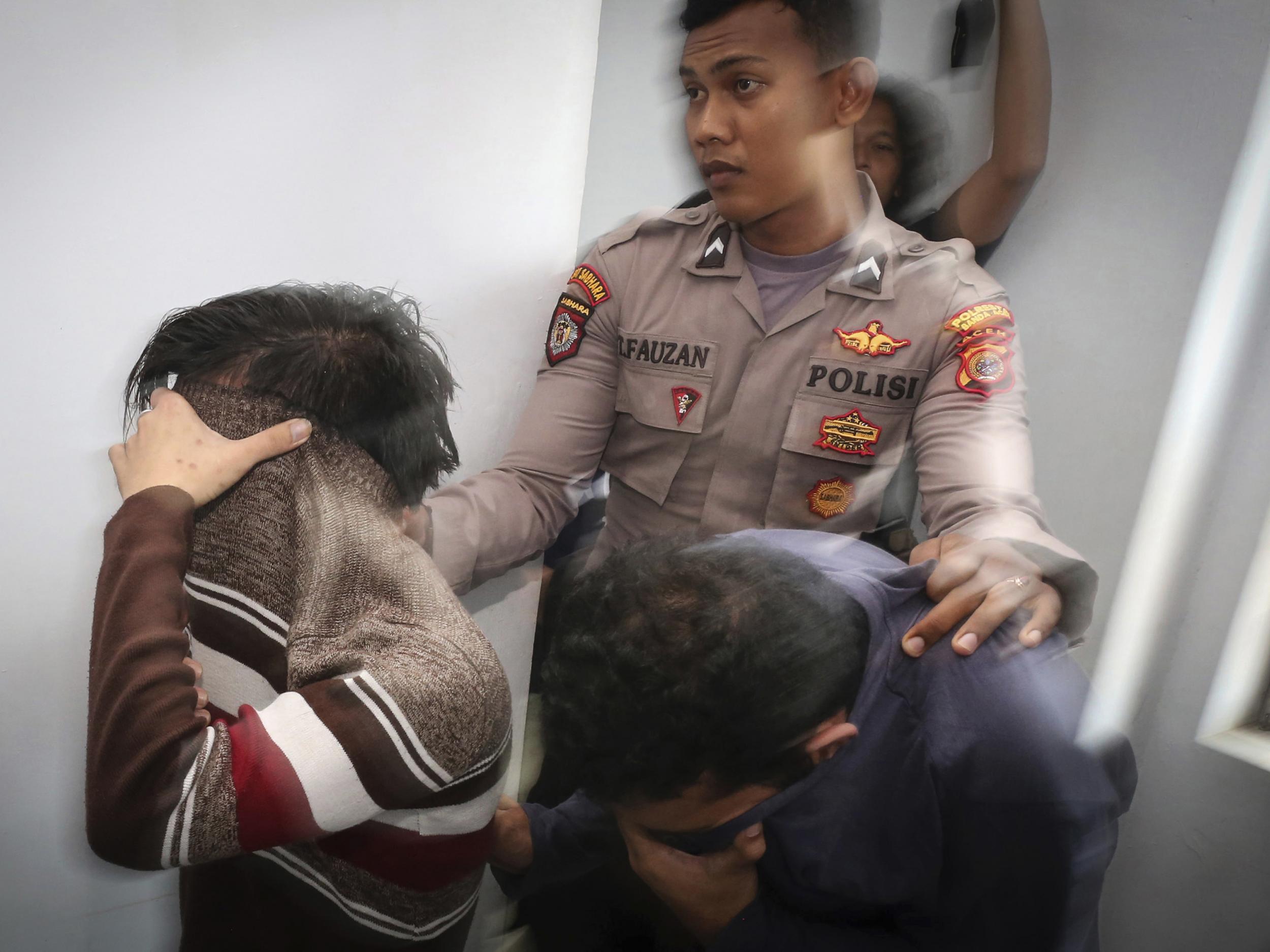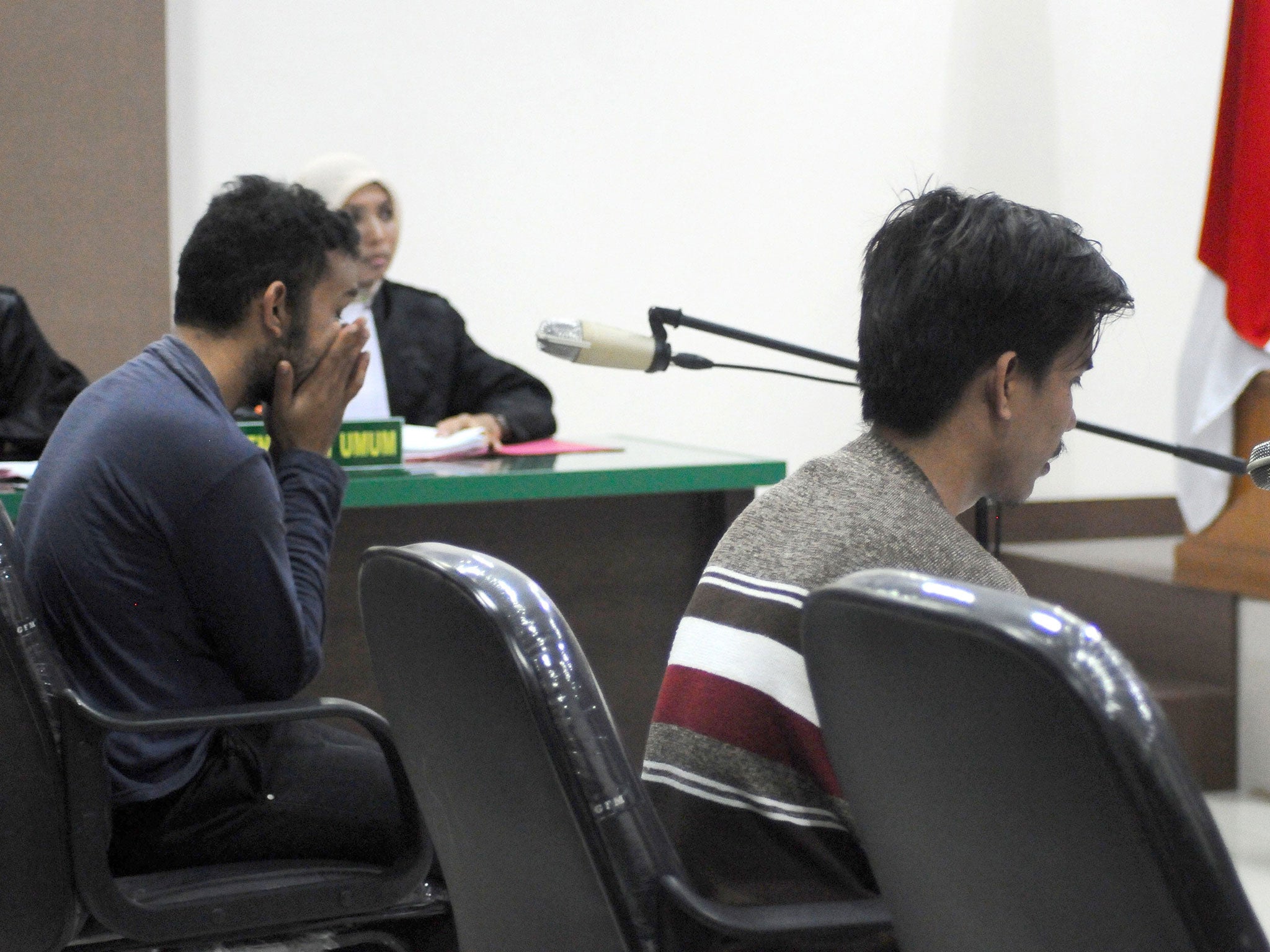Sharia court in Indonesia sentences two gay men to 85 lashes each after being caught having sex
Men will be publicly caned in province of Aceh for breaking sharia law

Your support helps us to tell the story
From reproductive rights to climate change to Big Tech, The Independent is on the ground when the story is developing. Whether it's investigating the financials of Elon Musk's pro-Trump PAC or producing our latest documentary, 'The A Word', which shines a light on the American women fighting for reproductive rights, we know how important it is to parse out the facts from the messaging.
At such a critical moment in US history, we need reporters on the ground. Your donation allows us to keep sending journalists to speak to both sides of the story.
The Independent is trusted by Americans across the entire political spectrum. And unlike many other quality news outlets, we choose not to lock Americans out of our reporting and analysis with paywalls. We believe quality journalism should be available to everyone, paid for by those who can afford it.
Your support makes all the difference.Two gay men are to be publicly lashed 85 times each under sharia law after being filmed by vigilantes in Indonesia.
An Islamic court in the province of Aceh passed down its first sentence for homosexuality on the International Day Against Homophobia and Transphobia, in spite of international appeals to spare the couple.
One of the men wept as the punishment was read out and pleaded for leniency from the panel of three judges.
But the chief prosecutor, Gulmaini, who goes by one name, said the pair would be caned next week ahead of the start of the Islamic holy month of Ramadan.
Lead judge Khairil Jamal claimed they were “legally and convincingly proven to have committed gay sex” but said the panel decided against imposing the maximum 100-lash sentence because the men were polite in court, cooperated with authorities and had no previous convictions.
“As Muslims, the defendants should uphold the sharia law that prevails in Aceh,” he added.
Prosecutors had requested a slightly lower sentence of 80 lashes each and claimed the couple waived their right to defence lawyers.
Human Rights Watch condemned the decision, following growing alarm about attacks on minorities and fears for diversity and pluralism in Indonesia.
“These young men are two Indonesians who wanted nothing more than to live their lives and have their privacy respected,” said Kyle Knight, an LGBT rights researcher at Human Rights Watch.
“Now they await a public flogging.”
The men, aged 20 and 23, met at a rented flat in the city of Banda Aceh on 28 March, unaware they were being watched by vigilantes who barged in three hours later.
Footage that was later used as evidence for the prosecution showed to invaders calling the men “dogs” as they filmed them and called the local sharia police.
One naked man is clearly visibly distressed as he calls for help on his mobile phone, while another is repeatedly pushed by a vigilante preventing them from fleeing, begging: “Please brother, please stop… my parents want to talk to you, they can pick me up.”
Aceh’s sharia code allows up to 100 lashes for “morality” offences including adultery, gambling, drinking alcohol, women who wear tight clothes and men who skip Friday prayers.
The punishment was imposed on 339 people in 2016, despite being recognised as torture under international law.
Aceh is the only province in Indonesia to practice sharia law brought in two years ago as a concession made by the national government in 2006 to end a war with separatists.
Reforms allow members of the public as well as the special sharia police to publicly identify and detain anyone suspected of violating its rules, which specifically outlaw liwath (sodomy) and musahabah (lesbian sex).

They have seen several LGBT suspects detained, including two teenage girls arrested in 2015 on suspicion of being lesbians after embracing in public, as the state parliament has gradually adopted hardline laws to criminalise women who do not wear headscarves, drinking alcohol, gambling, and extramarital sex.
Homosexuality is not illegal elsewhere in Indonesia but a case before the country’s Constitutional Court is seeking to criminalise consensual same-sex relations and sex outside marriage.
Local government officials have been accused of stoking homophobia with inflammatory statements, including a deputy mayor’s claim that the LGBT community is a “threat” and must be “trained to return to a normal life”.
Reports of homophobic attacks in Indonesia have increased since the start of 2016, raising alarm at the UN with police raids, crackdowns on LGBT activists and political rhetoric, despite public denouncements of discrimination by President Joko Widodo.
Government institutions including the National Broadcasting Commission and the National Child Protection Commission have also issued censorship directives banning information and broadcasts that portrayed the lives of LGBT people as “normal”, similar to Russia’s “gay propaganda law”.
The country’s reputation for practicing a moderate form of Islam has been damaged in the past year due to attacks on religious minorities, a surge in persecution and a polarising election campaign for Jakarta governor that highlighted the growing strength of fundamentalist groups.
Basuki “Ahok” Purnama, the outgoing governor of Jakarta and a member of the city’s Christian minority, was sentenced to two years prison for allegedly blaspheming the Quran earlier this month.
There are growing fears that Islamists including the extremist Islamic Defenders Front are in the ascendancy in a country home to sizeable communities of Hindus, Christians, Buddhists and other minorities.
As well as home-grown groups, Indonesia is among the Asian nations targeted for expansion by Isis, which launched an attack in Jakarta in January 2016.
Additional reporting by AP
Join our commenting forum
Join thought-provoking conversations, follow other Independent readers and see their replies
Comments